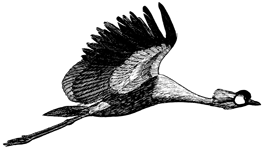Papers in the Biological Sciences

Cranes of the World by Paul A. Johnsgard
Date of this Version
January 1983
Document Type
Book Chapter
Abstract
Other Vernacular Names:
None in general English use; Huan-has (Chinese); Grue-moine (French); Monchskranich (German); Nabe-zuru (Japanese); Chernyi zhuravl (Russian); Grulla capachina (Spanish).
Range:
Breeding range not well known, but currently known to breed only in a few isolated areas of the USSR, including the Ussuri River and the lower Amur, in the basin of the middle reaches of the Vilyuy, and in the Olekma-Chara uplands. Breeding probably also occurs in the upper Nizhnaya Tunguska River and its tributary the Nyepa, along the Chona River, in the lower Amur along the In and Mukhen rivers, in the basin of the Evur River and Lake Evonon, in the upper part of the Gorin River, and in central Sakhalin. Possibly also breeds in northwestern Manchuria (Hai-la-erh) and the middle Sungari. Migratory, wintering in Korea (irregularly) and Japan (Kyushu and Honshu, Kagoshima and Yamaguchi prefectures, and formerly Hokkaido). Also winters in unknown numbers in the lower Yangtze Valley of China (Cheng, 1981), and has been seen rarely in India.


Comments
From Cranes of the World by Paul A. Johnsgard (Bloomington, IN: Indiana University Press, 1983; electronic edition: Lincoln, NE, 2008). Copyright © 1983 Paul A. Johnsgard.